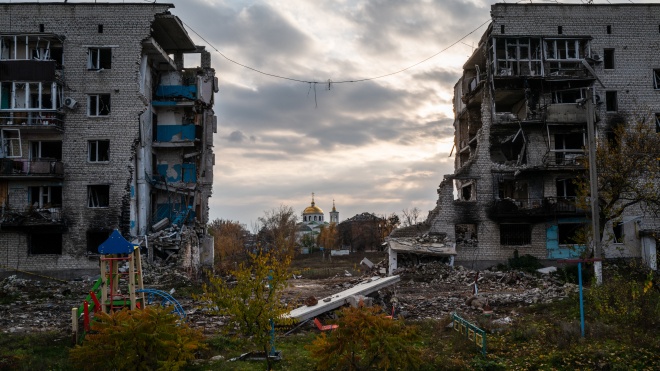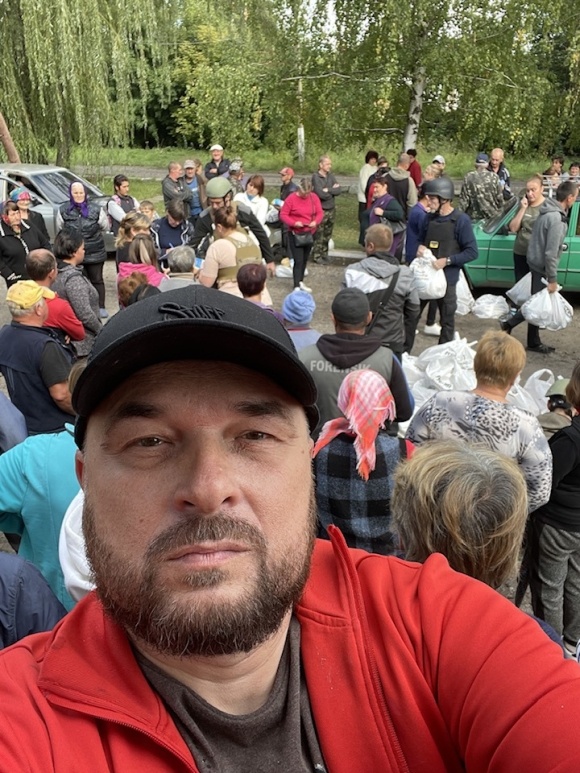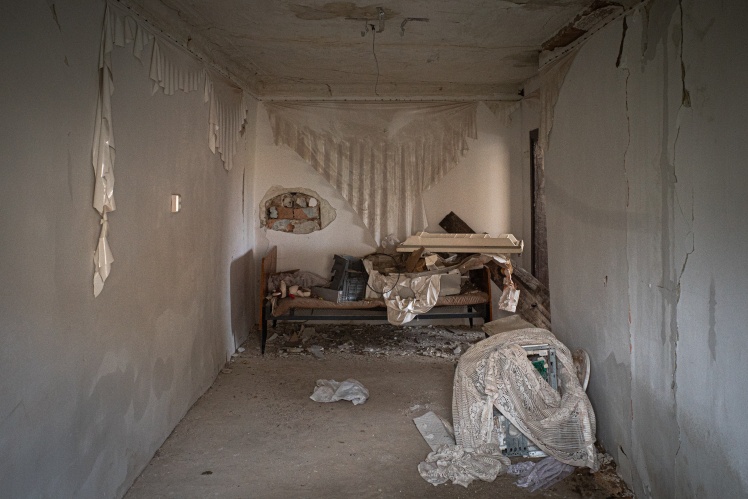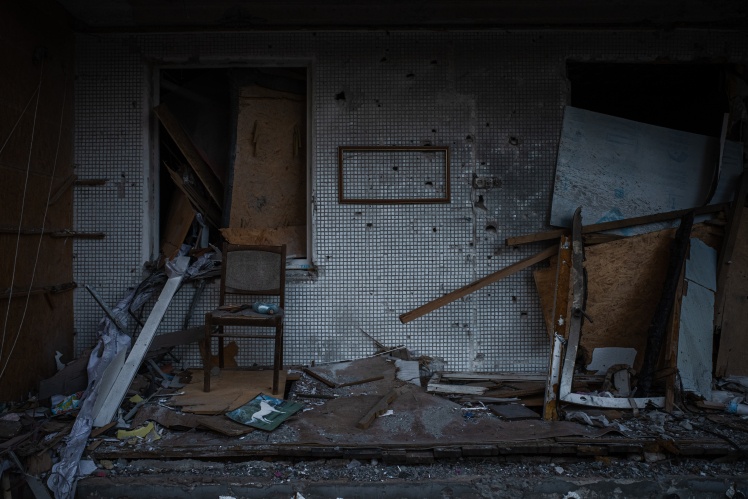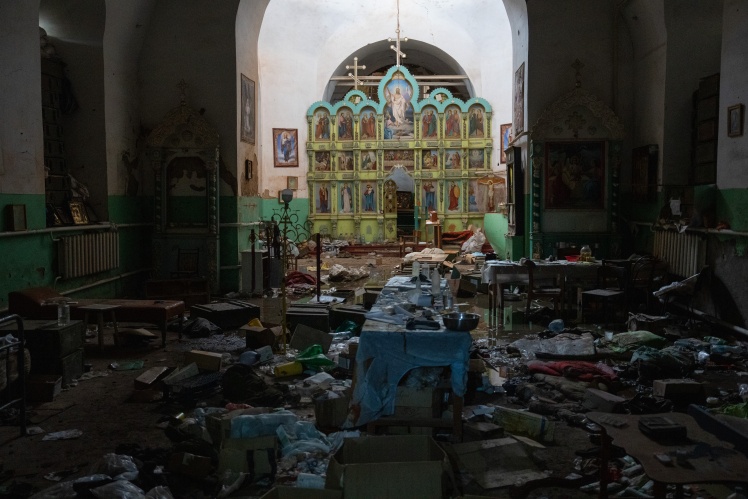Letʼs start with when and how exactly did you leave the city.
When we were leaving, the left bank of the city was occupied by the Russians. The central part wasnʼt occupied yet. On March 10, the Regional Military Administration of the Kharkiv region ordered local self-government bodies to evacuate. We left for Slovyansk, but for the next three days we came to Izyum every day with humanitarian aid and organized the evacuation.
The worst thing that happened was the aerial bombardment. The planes took off from Belgorod, and it took eight minutes to get to Izyum. Our night went like this: two planes dropped two bombs each, we had about a 40 minute break while they returned to the airfield, loaded up and flew back to us. They were not afraid, because our anti-aircraft defense was just being deployed.
This was the case from March 5 to 13, and the first air raid took place on March 3 — they destroyed Captain Orlov Street. On March 5-6, the Russians called the mayor and offered to meet, promising a calm night. But the mayor did not meet with them. The Russians wanted to go to Donbas, but Izyum itself allegedly did not interest them. The mayor is a civilian, he does not manage the military, they had nothing to talk about.
Volodymyr Matsokin.
Tell us about the evacuation.
We tried three times to evacuate people through the “green corridors”, which Iryna Vereshchuk agreed to. The first attempt was foiled by the Russians. During the second hour, only five buses came, they took people only from the southern bank, the bridges had already been destroyed. During the third evacuation, there were 60 buses, but people were enough only for 44. All three times there was no silence mode [promised by the army]. I was responsible for the evacuation of Gogol Street, I persuaded people, came under mortar fire. People refused to go.
There was no Internet, no radio. We didnʼt have generators then. We ran to the basements. And said to locals that there is an hour to pack the most necessary things. None of the residents thought that the shelling would last long. They wanted to wait it through.
Were there those waiting for the Russians?
There were lenient about it. Until the end of February, the executive committee was working, dealing with bomb shelters. Thatʼs about 90 people. One of its bosses said: “I donʼt care who is the authority, they just have to pay me salary.” Now she is in the Czech Republic as a refugee.
You worked on bomb shelters until the end of February. What else could be done?
Volunteers and I cleaned them, put them in order, brought in wood for the walls, and solved water issues. To be honest, we did not prepare for war.
Why didnʼt you prepare?
Because no one believed that there would be a war.
Well, whether you believed or you didnʼt, it was possible to prepare. Inspections of bomb shelters began in Kyiv a few weeks before the invasion.
We did the same. We prepared a list of bomb shelters, brought chairs and desks there, cleaned the ventilation points. Electricity was systematically checked.
Did you somehow prepare for the evacuation?
In March, I understood the word “evacuation” very poorly. Izyum was captured quickly, the railway was bombed, there was no communication. There was only one way out — to Slovyansk.
I didnʼt understand that it was necessary to prepare people, to propose a specific time, to explain what things and documents to collect. It would be a lie to say that we knew it.
Getty Images / «Babel'»
Do you think leaving the city was the right idea?
Should I have stayed? Whatʼs the point of this?
Since February 24, my colleagues and I spent the night in the executive committee in sleeping bags. I couldnʼt sleep, I wasnʼt in the mood, we drank coffee, played cards and talked. At that time, the Russians had already captured Kupyansk, we knew about the collaboration. I asked: “What to do when a Russian armored car drives into the square?” At first people refused to answer. And then the secretary said that he had nowhere to run, so he would stay here. The mayor said that he would ask for twenty minutes to collect the diploma cups and leave, because he was elected in a Ukrainian city according to Ukrainian legislation, and he would record a video for the citizens of Izyum, telling that he would not work for the occupiers.
And what was your answer?
I didnʼt have it. One acquaintance said that you definitely cannot stay under the occupation, because there are no laws there. I donʼt see the point in the local self-government bodies remaining under occupation.
People say you were running away.
Yes, I ran away. Should I have stayed to be hanged in the square? I didnʼt sign up for that.
Havenʼt you thought about armed struggle, creating a partisan unit?
There was nothing to join. We had Territorial Defense, Molotov cocktails, hunting weapons. While we stayed in the city, I had two contacts with the military. Perhaps the mayor communicated with them, knew who the commander was and what the tasks of the Territorial Defense were, but I did not know this.
Getty Images / «Babel'»
Was the Territorial Defense real, or only on paper?
It was real. They started forming a month before the invasion. They received premises, money, food, weapons, they conducted training. About 60-80 people signed up for the defense, though I could be wrong. Mobilization work is not my authority.
Who left the local government?
First, the mayor, two deputies and a secretary. Another deputy joined us in Slovyansk — he swam across the river. And then the younger brother of the mayor, a deputy, also joined. So there were six of us.
There are a total of 34 deputies and a mayor in Izyum, the majority left, but did not join us. We had an ideological split. Seventeen deputies are OPzZh and Svitlichna Bloc.
What did you do when you left?
For a month and a half, we were engaged in evacuation and humanitarian aid. Then we began to remotely restore local self-government — convened an executive committee, from September 1 schools started working remotely, we paid salaries. Although people have moved all over the world, many payments come from the local budget. There was enough of work.
How many people were able to leave thanks to you?
We didnʼt count — about 50 buses, up to 40 people in each. Many people left Izyum alone or with volunteers.
Sergey Morgunov / Babel
Was this disorganized evacuation natural or due to government malfunction?
According to statistics, before the war, Izyum had up to 51,000 inhabitants. In reality, there were less: part of this number are registered here, but live and work in Kharkiv, Kyiv, Russia, Poland, the Czech Republic... In fact, we served 35,000 people. About 20,000 of them left in the first two or three months of the full-scale war. There were 13,000 left who survived six months of occupation. Is it good or bad that people evacuated on their own? Not good. But this is war. And you canʼt compare, for example, the evacuation of Kharkiv with Izyum.
Could you have done more?
We could. But this is war and the human factor. You could try. But the “green corridors” were not agreed upon.
Was it necessary to wait for the corridors? Why didnʼt you coordinate with the volunteers?
We constantly cooperated with them. They coordinated hunters and workers of the forestry, who knew all the paths. We helped to meet people, ferry them across the river, tell them where there were bridges, asked the Ukrainian army to quiet down a little in certain areas — and people went out through the river.
What did the Russians loot during the six months of occupation?
They wanted to make a hub from Izyum, there always were about 26,000 Russians here. There were about six partial rotations, so in total 80-90 thousand of them visited the city. Each rotation arrived and started with looting. The first ones took the most valuable.
Everything was stolen. There are happy exceptions — for example, computers in the culture department and museum collections have survived. But they robbed music, art, sports schools, the executive committee building, hospitals, hotels, shops, pharmacies, private residences, restaurants, cafes, factories...
From the hospital they stole all computers, patient monitors, a mobile X-ray, a generator, equipment from the intensive care unit, almost a hundred oxygen concentrators, furniture, pillows and blankets. The fitness room was taken out in two hauls. They even took cisterns from toilets, twisted switches and sockets from walls, stole doors, lamps. In my house they even removed the plinth. Thatʼs funny.
Sergey Morgunov / Babel; Getty Images / «Babel'»
Are you sure that the Russians did all this?
Perhaps there also were local marauders. We did not investigate.
Were there many looters?
For the first ten days, the Russians did not enter the southern part of the city, and the locals looted there. You can understand the looting of products and medicines — but why steal keyboards, televisions, microwaves? There wasnʼt even any electricity. People really lost their heads. But itʼs unpleasant to talk about it: itʼs our fellows. I want to talk about brevity, not about that.
How much was the city destroyed?
85% of high-rise buildings, 35% of private houses were completely or partially destroyed. Now many people have moved into vacant homes of those who left.
There is no talk of reconstruction or demolition yet. We are now assessing the condition of the buildings. It will be possible to talk about reconstruction in the spring. Until then, we plan to survey the houses and prepare projects — it depends on funding. And now forecasting is like pointing a finger to the sky. If we forget about the war, then we have the task of getting through the winter.
How many locals have already returned to Izyum on the eve of winter?
About seven thousand, so now we have 20 thousand people.
Sergey Morgunov / Babel
Where should they live?
Where there is electricity, gas, communication. We started centralized heat supply — nine of the 24 boiler houses survived. We are restoring the water supply.
What to do if the house was destroyed, and the person returns?
I returned to Izyum on September 13, on the 16th we started working and announced a voluntary organized evacuation. A total of 28 people applied for it. The day before yesterday [October 28], we called them — there were 15 willing people left.
It makes no sense to take out people in groups of three or four in a coordinated manner. They leave with volunteers. And the rest remain because they gave electricity or there is no frost yet.
How do you prepare for winter in a broken city? Buying generators?
With the help of volunteers and the state. The situation with generators is normal, but they can break. We also get them as international aid. Izyum receives a lot of attention from the UN, the Refugee Committee, and the Red Cross.
Itʼs “interesting” to praise the Red Cross now.
We agreed with them on the organization of heating points, wrote an application — and they disappeared. Maybe they will show up tomorrow. But we will certainly make seven heating points in lyceums, kindergartens, cultural centers, also there will be tents. If it doesnʼt work out with the Red Cross, the State Emergency Service will help us.
Sergey Morgunov / Babel
471 bodies were exhumed in Izyum. Mayor Valeriy Marchenko assumes that about a thousand people were killed during the occupation. Do you agree with this?
I think there are many more stories waiting for us. These 471 bodies are from a mass burial, which the Russians and collaborators did not hide. And there were also burials in forests, in abandoned houses. The exhumed bodies are kept in Kharkiv.
Is the situation in the city morgue of Izyum difficult now?
Itʼs actually awful. The medical examiner was shot, the pathologists left and did not return. The funeral service is broken. In March were stacked up to the ceiling. The bodies were sprinkled with washing powder — and that was it.
As part of the “Great construction”, we did a lot in the medical town, but we did not reach the morgue. They just bought two refrigerators, but thatʼs not enough. The Russians did not take them away. Now there are 14 bodies in the morgue. For us, the International Medical Corps hired a pathologist for two weeks to do the autopsies and the paperwork. When we solve this critical situation, weʼll decide what to do.
Sergey Morgunov / Babel
You mentioned your dadʼs evacuation. Tell me about it.
Collaborators definitely gave the Russians very accurate lists of local authorities, activists, military, law enforcement officers, and their families. Then here worked the FSB, intelligence, and counterintelligence.
My father was the only one in the family who did not want to leave. The Russians came to him after Easter — and the terror began. They knew about me, about my wife. But they asked my father where Angelica lives, my sonʼs girlfriend, whom he introduced us to on the New Yearʼs celebration. They knew even such details.
Then they came to see my father again. He was threatened and robbed. He was pressured, but not beaten. He is 76 years old, worked at a factory and lived in honor all his life. He couldnʼt stand it. At the end of July, he stepped on a "petal" mine, injured his leg — this was the last straw for him. Volunteers took the father out of the already closed city by detours. Through the Pechenihy reservoir, he walked one and a half kilometers with an injury.
Surrender of the city is connected with detours and secret ways. Collaborator Anatoliy Fomichevskyi showed them to the Russians. Did you expect this from him?
Yes, I was sure he would. I can say one hundred percent that at least three people in Izyum were Russiaʼs “sleeping agents”: Vladyslav Sokolov, Glib Tkachenko, Anatoliy Fomichevskyi. Iʼm sure they profited from it. And they were ready to capturing of the city: they appeared immediately, began to organize the “administration”.
Fomichevskyi is a rare bastard. He showed the Russians a truly little-known path.
Back in 2014, I told Fomichevskyi that I knew he was supposed to raise the flag of the Kharkiv Peopleʼs Republic. And Tolik smiled and kept silent. He was careful and cunning — he sensed danger. After all, another person painted Russian flags here, but that man died in 2014. This time [Fomichevskyi] was unable to bounce back. He had to pay back [he Russians]. He never had a job, but was in the political struggle, appeared on Moscow TV, flew to Cuba via Moscow.
Sergey Morgunov / Babel
Did the Security Service of Ukraine have questions for him?
Yes, the SSU had them. It ended in nothing. I would really like to punch those who didnʼt led this to the end.
I know less about Tkachenko and Sokolov. Sokolovʼs son was already a military man in Crimea after 2014. Sokolov went to see him. He himself was a security guard at Oschadbank, once he took the last place in the mayoral elections of Izyum. And Tkachenko studied in Belgorod and had a business there. All three left for Belgorod, I donʼt know what happened to them after that.
How did Fomichevskyiʼs colleagues in the political party react to the collaboration?
Most of them have disappeared. Three left for de-occupied territories, and I donʼt know about the rest.
Were there collaborators among doctors and teachers?
I donʼt know how many, but there were. In the local self-government, one person from the secretariat received suspicion [in committing a crime] for joining the occupational “administration”. There is still an unclear situation with one village head. About ten local self-government employees left for Russia or Belarus. We have a total of 400 educators, of whom 25 went to Kursk for courses. I donʼt think that these are all who were going to cooperate with the Russians.
How do you plan to find out who wanted to work for the occupiers?
There are managers for that. Do you think they donʼt know who did what? But they themselves will tell everything about each other. Itʼs possible to understand when doctors work under the occupation, but not educators. I donʼt want these people working in education now. I think there should be administrative responsibility, a fine, and ban on the profession for trips to “reeducation” courses. But not to imprison a person for 10 years.
Sergey Morgunov / Babel
Why do you think that traveling to courses [in Russia] doesnʼt mean criminal responsibility?
We donʼt have that many prisons. But the people who managed education under the occupiers, those who signed something, should bear criminal responsibility.
After everything that happened in Izyum, can the city come back to life?
Yes, one hundred percent. Izyum deserved a future life, and even a happy one. Prince Igor fought here, and Volodymyr Monomakh, and the Cumans were driven here, and it was hot here during the Second World War — something was happening all the time. No, we just have to go on.
People who live in the city now didnʼt experience historical events, only the present ones. They will know who betrayed whom, who was a collaborator, where the torture chambers were.
Itʼs very difficult, but it will have to be lived through. Someone wonʼt be able to, someone will break. Someone will know that the neighbor brought dumplings to the Russians at the roadblock — we also had that. It takes a decade to get through this. I donʼt know whether this will happen by itself, or the state will somehow direct these processes. Now in Izyum there are people who survived the occupation and those who returned. In the spring people will come back from abroad. They all have different experiences. Only later will we see how all this society can live together. We are not trained to experience this. I donʼt know how it will be — and Iʼm even somewhat afraid of it.
Sergey Morgunov / Babel
Translated from Ukrainian by Anton Semyzhenko.
